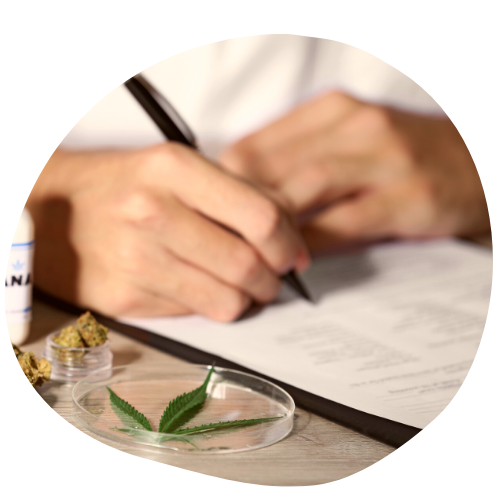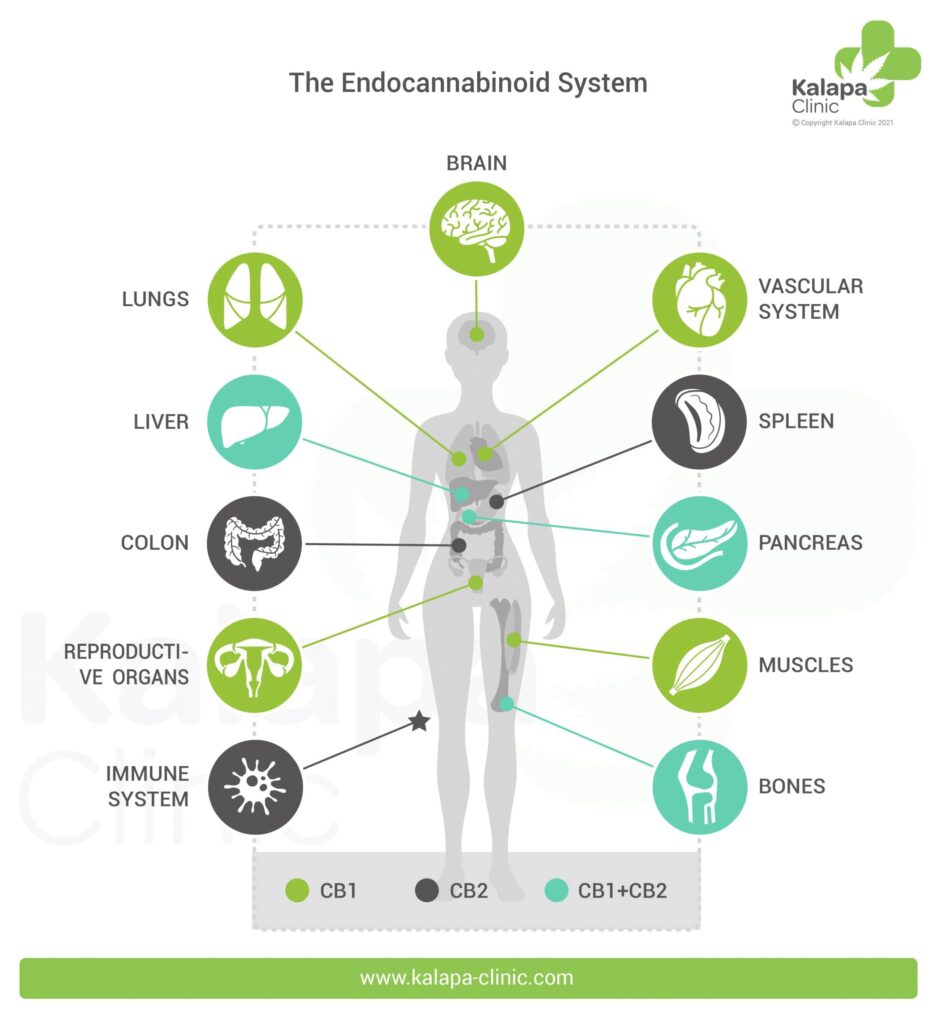
What is the Endocannabinoid System (ECS)?
The endocannabinoid system is a very sophisticated system which has been present since the beginning of time, but we had no idea such a system existed until the middle of the last century.
In the 1960s, an Israeli scientist discovered that virtually every cell in the human body has receptors for cannabinoids. These receptors sit on the surface of cells and, figuratively speaking, are like a lock-in in need of a key. All receptors are specific to an individual key.
For example, insulin receptors are the lock that insulin fits as the key. When insulin fits into the receptor, the door to the cell is opened, and insulin enters the cell to control the blood glucose.
There are more cannabinoid receptors in the human body than any other form of receptors. The question was then asked, “what was the purpose of these receptors?”. It wasn’t until the 1980s that the key to the cannabinoid receptors was discovered – endocannabinoids!
Scientists discovered that every cell in the body could manufacture endocannabinoids when required and break them down again to be recycled when their function is complete.
Endocannabinoids are the key which fits in the lock to produce their magic!
What’s the role of the Endocannabinoid System?
ECS is a highly sophisticated messenger system whose job is to oversee and control all other systems in our body to maintain balance.
Within our ECS, there are two main receptors, CB1 and CB2. CB1 receptors are mostly found in the brain and the central nervous system. The CB2 receptors are located throughout the immune system.
Two major endocannabinoids are produced in the human body, anandamide and 2-arachidonolyglcerol (2-AG). When the body produces anandamide and 2-AG, they bind to the CB1 and CB2 receptors, signalling when the system needs to relieve pain in the nervous system or when your body’s experiencing inflammation.
The endocannabinoid system plays a vital role in regulating a range of functions in our body, including:
- Appetite
- Fertility
- Immune system
- Inflammation
- Memory
- Mood
- Pain
- Skin health
- Sleep
- Stress
The Role of the ECS in Chronic Disease Management
The ECS is essential in managing chronic diseases, especially by exerting its role in regulating inflammation and pain. For example, there are reports that ECS modulates immune responses; therefore, this system is interested in targeting treatment research against autoimmunity and chronic inflammatory diseases.
Medicinal cannabis is increasingly used in New Zealand to support patients living with multiple sclerosis, chronic pain, and cancer, showing significant improvements in the management of symptoms.
How does the Endocannabinoid System work?
It’s all about balance. If anything is out of balance in the body, the endocannabinoid system works to bring the body back into balance or, in scientific terms, homeostasis.
The human body is an electrochemical system with billions of reactions occurring every second of the day. To be effective, these reactions must work in harmony. The endocannabinoid system is like a thermostat rather than an on/off switch.
When a person is sick or injured, it throws off the body’s homeostasis, and the ECS kicks in to restore balance in the body.
Comparing this process to an oven, the temperature must be right…too hot, and your cake will burn and too cold, your cake won’t bake! The endocannabinoid system works to maintain the body in homeostasis and to keep everything functioning in harmony.
New Zealand researchers and institutions are targeting the ECS for the treatment of disorders such as chronic pain, epilepsy, anxiety, and others, thus actively contributing to the growing body of knowledge in this field.
Recent Advances in ECS Research
The ECS has recently been recognised as one of the more active fields of research, and the evidence so far obtained positions it centrally in maintaining the physiological balance of homeostasis. The recent findings further implicate its role in controlling the immune response, stress, and neuroprotection.
How Lifestyle Factors Affect the Endocannabinoid System
This means that lifestyle factors relating to food, exercise, and stress also interfere with the functioning process of ECS. Conversely, regular physical activity has been evidenced to increase the production of endocannabinoids, justifying the cause of the “runner’s high” and increased feelings.
An omega-3 fatty acid-rich diet can help sustain the health of ECS by offering the essential elements of endocannabinoids. Grasping these interrelations could help everybody improve ECS functioning and general health.
Are there cannabinoids in plants?
Put simply, yes. Cannabinoids found in plants, also called phytocannabinoids, are very similar in chemical structure to our endocannabinoids.
At the last count, the marijuana plant can produce over 120 phytocannabinoids and other molecules such as terpenes and flavonoids, which can improve health. Cannabidiol (CBD) and tetrahydrocannabinol (THC) are common phytocannabinoids found in cannabis.
How does medicinal cannabis interact with our ECS?
When used as medicine, THC compounds can connect with and influence the same CB1 and CB2 receptors and pathways as our endocannabinoids. They may also improve the effectiveness of our existing endocannabinoids. However, CBD doesn’t interact with the receptors in the same way THC does. Instead, CBD upregulates by boosting our endocannabinoids’ level and interacts with our other receptors, such as serotonin and opioid receptors.
These plant-based cannabinoids may reboot a normal metabolic process to keep the body in healthy homeostasis.
Medicinal Cannabis can be seen as a multifaceted approach as it can influence multiple health symptoms simultaneously, such as pain, sleep, anxiety, and depression.
Pharmaceutical drugs, on the other hand, act like single bullets. You can have a pill for pain, another pill for sleep, and another pill for anxiety. Pharmaceutical drugs also don’t upregulate, but they tend to interfere with the body’s natural metabolic processes. This can lead to multiple unintended side effects.
Because of this, many patients are now seeking natural health treatments. After what we’ve learned, what could be more natural than how our ECS responds to THC and CBD compounds found in medicinal cannabis?
This has been a bird’s eye view of the endocannabinoid system. There is still so much to learn as scientists continue to discover the benefits of natural health treatments and the use of medicinal cannabis.

Are you having problems with sleep, appetite, mental health issues, pain, or inflammations?
Talk to our friendly team at Cannabis Clinic to see if medicinal cannabis may help.
Disclaimer – medicinal cannabis and CBD oil are unapproved medicines in NZ which means that there is no conclusive evidence for their effect, apart from Sativex. Many doctors do not routinely prescribe cannabis medicines. The above article was written for general educational purposes and does not intend to suggest that medicinal cannabis can be used to treat any health condition. Please consult with your healthcare provider.

Disclaimer: Medicinal cannabis and CBD oil are unapproved medicines in NZ which means that there is no conclusive evidence for their effect, apart from Sativex. Many doctors do not routinely prescribe cannabis medicines. The above article was written for general educational purposes and does not intend to suggest that medicinal cannabis can be used to treat any health condition. Please consult with your healthcare provider.